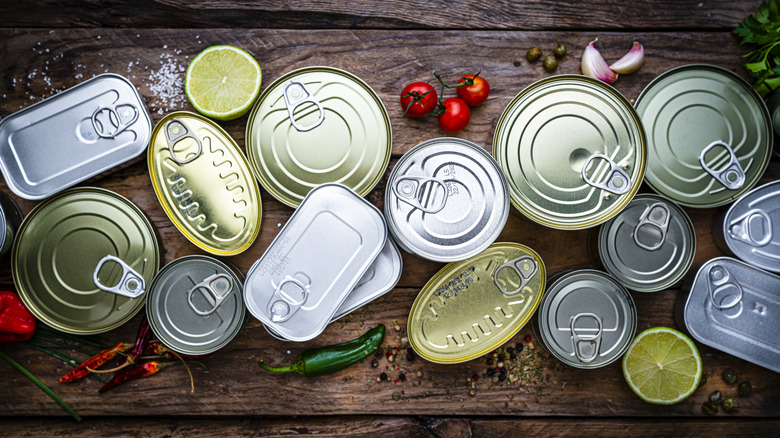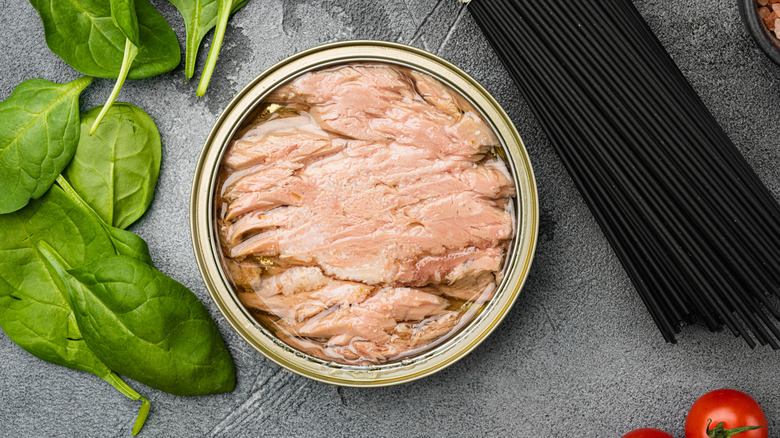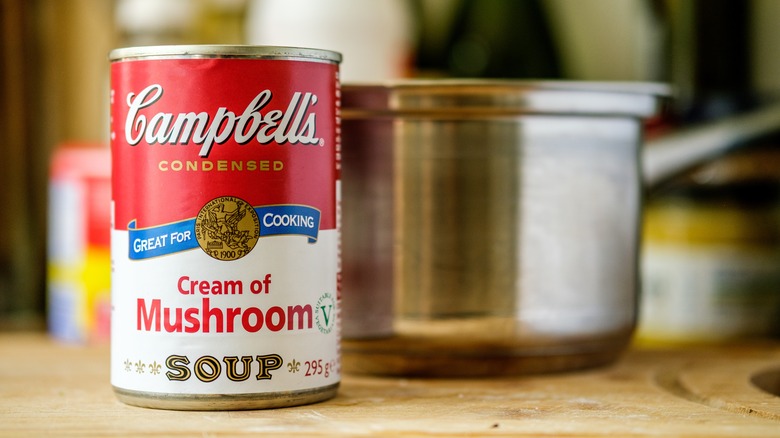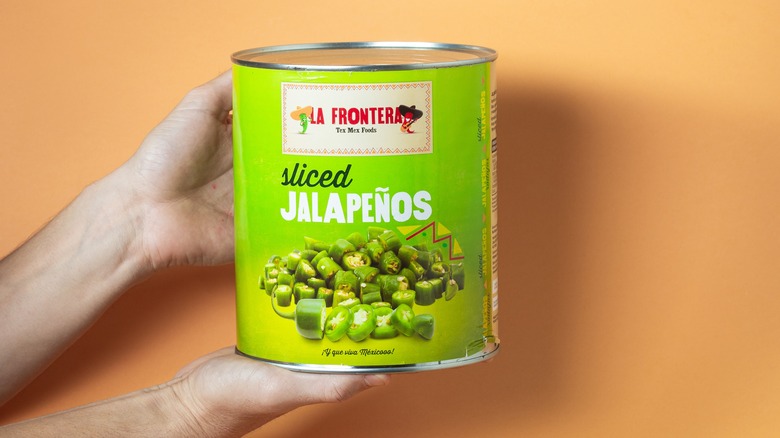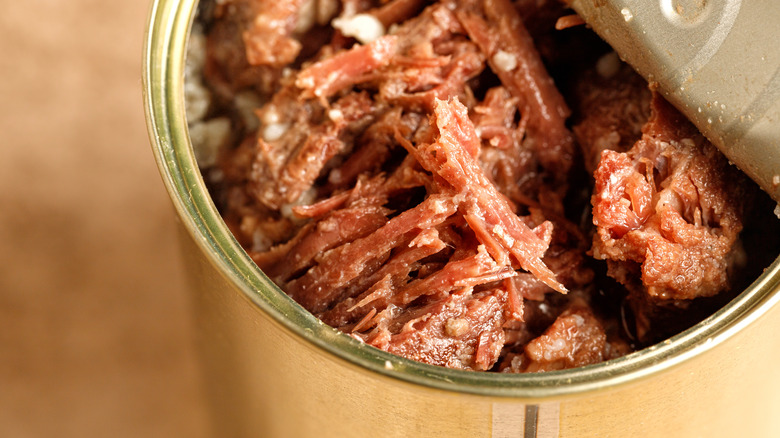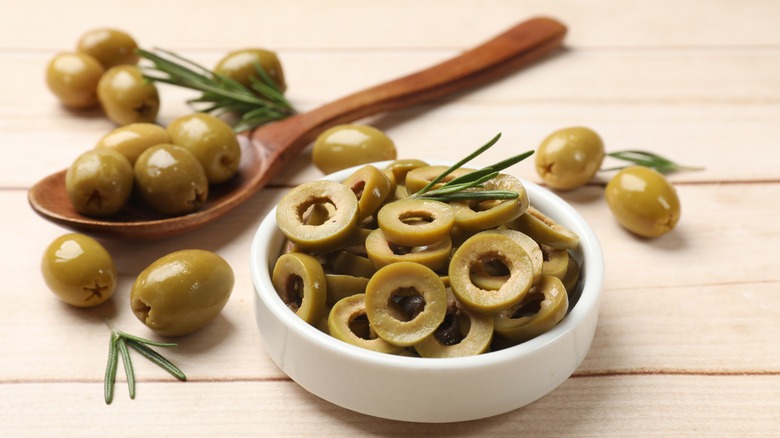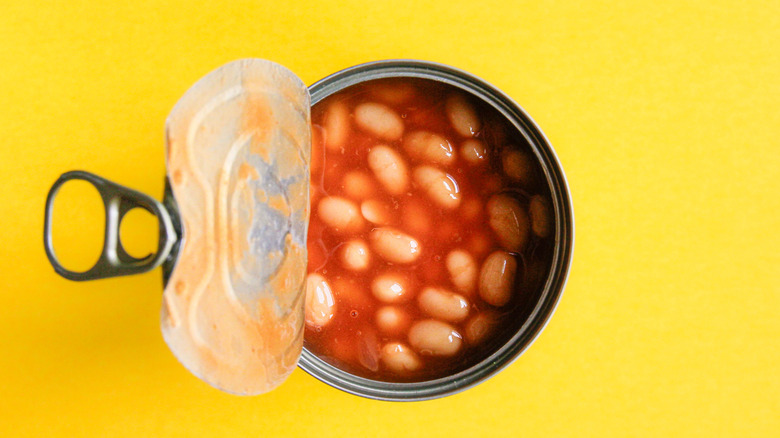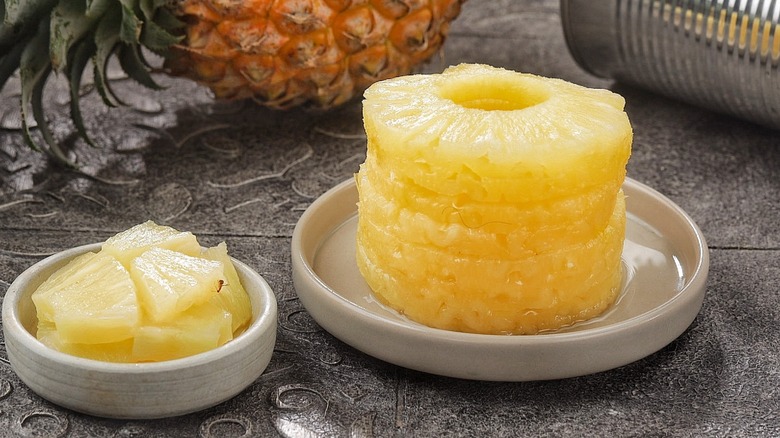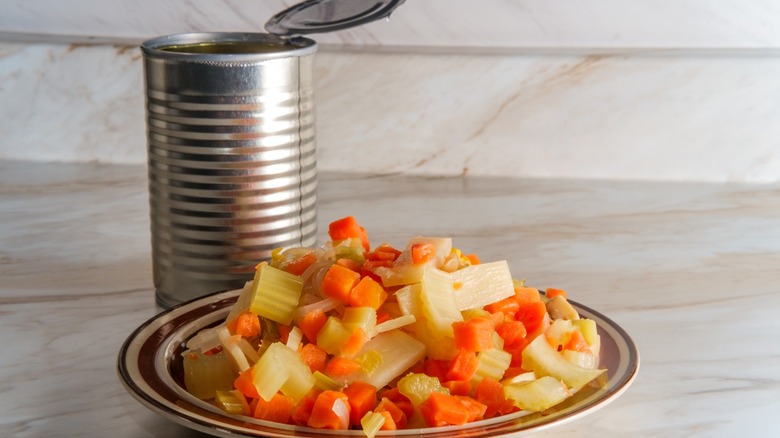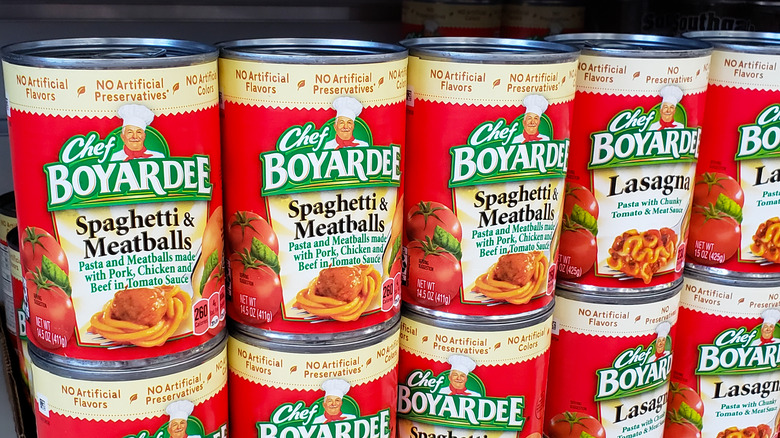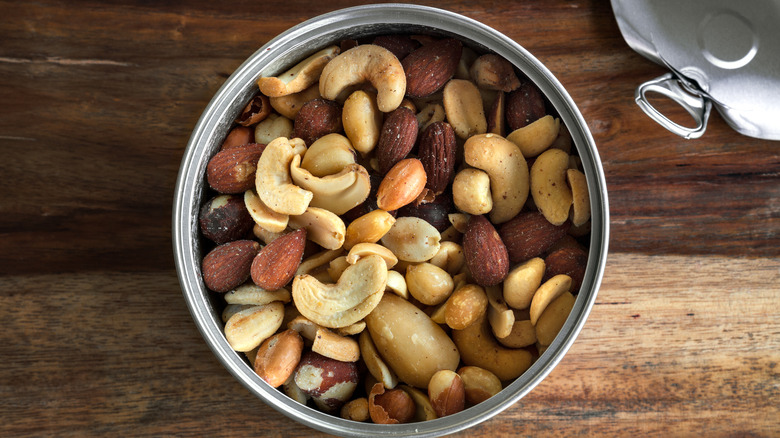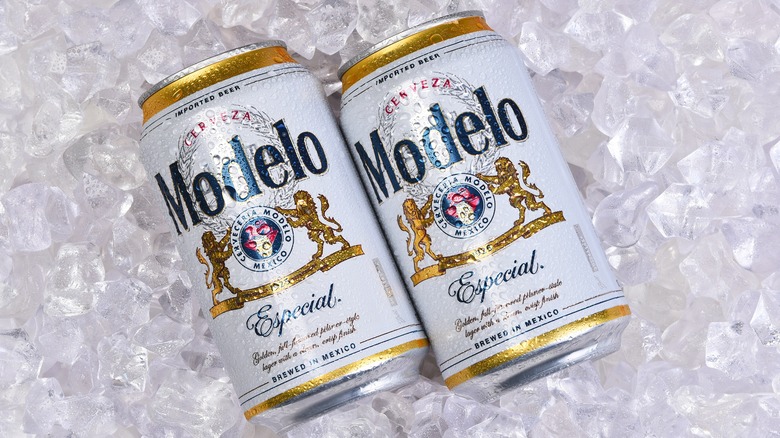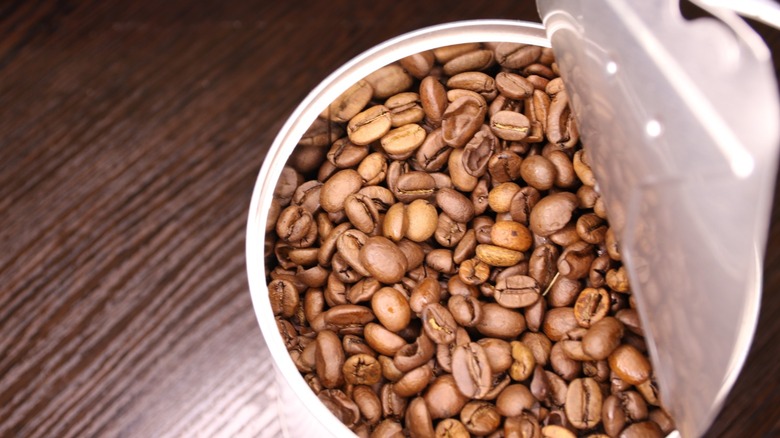12 Canned Foods That Could Be Getting More Expensive
Concerned about your grocery bill lately? You're not alone. Food prices continue to soar, and many budget-conscious shoppers are adjusting their lifestyles accordingly. Purchasing canned goods is just one way to offset future price hikes. Unfortunately, even this pantry staple isn't immune to economic pressures. Several factors are converging that could push canned food prices even higher in the coming months.
The most obvious threat is metal tariffs. Higher tariffs on imported steel and aluminum – the primary materials used in making food cans – are increasing production costs. Demand for domestic alternatives has surged, driving up canned food prices across the board. However, it's not just about the can. Tariffs are affecting raw ingredients inside canned goods as well. Many countries we source ingredients from are dealing with a 10% export tax, which may increase when the tariff pause is lifted. Even without additional tariffs, high demand, poor crop yields, and sourcing challenges can drive prices upwards.
Some canned goods are more vulnerable than others, depending on their ingredients and where they originate. After reviewing recent news reports and market data, we've identified canned foods that are likely becoming more expensive in the near future. If these items are staples in your pantry, stock up sooner rather than later.
Tuna fish
Fish fans beware: Canned tuna fish is swimming toward higher price points. CNN reports that even before tariffs went into effect, wholesale suppliers preemptively increased the cost of canned tuna, creating a ripple effect that is bound to reach stores and consumers. However, it's not just the cost of the cans becoming pricier, but the tuna itself.
Thanks to the Trump administration's tariffs, imported goods are at risk of price increases, and unfortunately, this includes tuna fish. The U.S. is the world's largest tuna importer, with the largest amount coming from Thailand, per the World Trade Organization. Under the new regulations, Thailand would be forced to pay a 36% tariff to sell its products Stateside. Meanwhile, Vietnam is the second-largest importer of canned tuna, and the country faces a 46% tariff.
The 90-day pause on tariffs is providing temporary relief. But what happens when it's over? We enter uncharted waters, and while nothing is for certain, these figures make it highly likely that canned tuna fish will become more expensive. Not to mention, the tuna and the can are just two pieces of the puzzle. Impending tariffs could also affect other components like oil, seasonings, and packaging materials. So, if you're running low on canned fish, stock up on the best canned tuna brands while they're somewhat affordable.
Soup
That comforting bowl of canned soup is becoming less comforting on your wallet. In just the past year, canned soup prices have risen by about 10%, notes ESS, outpacing general inflation. Consumers are getting heated, but increasing soup prices are nothing new. Older Reddit threads have documented the rising cost, with consumers complaining that "soup has gotten so expensive" and "it's not even worth the cost anymore."
Soup often combines multiple ingredients, which may be threatened by tariffs. For example, Progresso's Garden Vegetable soup contains green beans, kidney beans, corn, carrots, and tomatoes among several other ingredients. What are the chances that all these foods originate in the U.S.? Considering the majority of carrots and green beans are grown in China, the odds aren't great.
Increased prices may push consumers to buy less canned soup, dilute what they have, or make entirely homemade recipes. The beauty of soup is that there are so many different varieties — and you can pick and choose ingredients based on what is available and most affordable. When making your own soup, learn how to properly freeze it for later. It won't be as convenient as buying the canned stuff, but it might save you money.
Chili peppers
Canned chili peppers may soon burn a hole in your pocket. From pickled jalapeños to diced green chilies and fire-roasted tomatoes with peppers, these kitchen essentials feel like they're becoming more expensive. Essential Food and Beverage Industry News for Professionals reports that wholesale chili prices have increased 15%, and that financial fire is bound to spread to consumers.
Part of the problem is weather related. Limited supplies can drive up prices, and chili crops are susceptible to droughts, floods, and other extreme weather-related events. Another issue is shifting agricultural practices. Domestic chili pepper production has been steadily declining, while imports have increased. However, demand is higher than ever before. According to Research and Markets, the global chili pepper market is growing at a rate of 6.4%.
It feels like you always need a can of chili peppers in your cupboard. Whether adding canned chili peppers to scrambled eggs, stir-fries, or pizza, this simple ingredient contributes a flavor and sensory bomb. Sadly, there's not much you can do to prevent rising costs. You could always plant spicy peppers in your backyard, but before they bear fruit, stockpile canned peppers just to be safe.
Beef
On a budget? Beef might not be for dinner. Beef in all forms, including canned varieties like beef stew, corned beef hash, and roast beef, is experiencing serious price pressures. The combination of packaging costs and beef industry dynamics has created the perfect storm. As a result, industry analysts are predicting a sharp price increase.
Raw material costs for producing canned meat have surged dramatically in the post-COVID-19 pandemic economy. Meanwhile, the Russia-Ukraine conflict has destabilized global grain markets, which has a trickle-down effect on cattle-raising costs. After all, livestock feed can come at a steep price. The timing couldn't be worse, seeing how the U.S. cattle industry is experiencing a low point. The USDA projects that the cattle inventory will continue decreasing through 2025, plummeting to roughly 86 million head, a low we haven't seen since 1951. With such a serious downturn, the department predicts record-high prices starting in 2026.
Despite all this, consumers are gravitating more to canned products like beef. After all, it's hard to find protein-packed canned foods with that umami quality. And seeing how you can get canned beef delivered right to your doorstep makes it hard to resist. But if you need to cut back on spending, prioritize your canned meat purchases. Not all canned beef is created equal, and there are canned meats you should eat and others you should avoid (spoiler alert: Canned roast beef is a solid option, while corned beef hash is best made from scratch).
Olives
Olive prices are growing far faster than olive trees — which is part of the problem. Climate change is a major culprit behind these increased prices since olive trees are especially vulnerable to shifting weather patterns. Drought and extreme heat have decimated crops, causing a serious supply chain problem in recent years. CNBC reports that Spain, the world's largest olive oil exporter, is producing half its normal amount. And this agricultural issue doesn't just impact olive oil, but all olive products.
Trade tensions are worsening the situation. Spain and Greece, America's top suppliers of table olives, currently face a 10% EU export tariff. This will double to 20% when the temporary tariff ends in July. Despite EU efforts to negotiate better terms, the outcome is still uncertain.
Olive enthusiasts are naturally concerned about future affordability. Luckily, canned olives have a significant shelf life. Even an open container of olives lasts a long time — up to 18 months when sealed and stored properly. Is it long enough to survive the potential price swing? Nobody knows for sure, but it's definitely worth trying.
Beans
Beans are having a moment. They've always been touted as nutritional powerhouses, but their recent popularity stems from a rise in plant-based eating and an increased focus on protein. This growing demand has put more pressure on the supply chain. Luckily, the United States is one of the largest producers of canned beans. However, not all our beans are grown and packaged in the United States, and other ingredients or materials face import fees.
Goya sources its beans from all around the world, and many of these countries are likely facing increased taxation. Mexico is a leading producer of pinto beans, and China exports a significant amount of black beans, just to name a few. Meanwhile, canned refried beans can be made within the country, but several raw ingredients are sourced elsewhere. China produces the vast majority of the world's garlic, and you can't have refried beans without garlic powder (it just doesn't taste the same).
If you're worried about rising costs, consider going for dry beans over canned. Dry beans are often more economical, have a better flavor and texture, and are more versatile. Dried beans require more time to prepare, but you have more control. We recommend adding preferred seasoning while cooking to create beans far more flavorful than canned varieties.
Tropical fruit
Tropical fruit prices are about to go bananas. Those canned pineapples and other sun-kissed fruits are facing serious inflation pressure. When it comes to these fruits, the U.S. relies heavily on imports. The country is the biggest pineapple consumer in the world, yet most pineapples are imported from Costa Rica. And while bananas are considered the most popular fruit nationwide, per Statista, most come from Guatemala. The U.S. also imports tropical fruits from Mexico, Colombia, Peru, and Ecuador.
Overall, Rabobank research estimated that tropical fruit prices could increase between 9% to 18%. Luckily, Mexico is covered under the USMCA Trade Agreement through 2036, meaning any produce from this region is exempt from tariffs. Most mangos and papayas are imported from Mexico, so fingers crossed these canned fruit prices remain steady. Unfortunately, canned pineapple is another story. According to Bloomberg, Dole is increasing the cost of canned pineapple products in June 2025 due to rising commodity costs and supply challenges. We worry other canned fruits, like mixed tropical fruits and fruit cocktail, may follow suit.
Should you say ta-ta to tropical fruits? It depends on your budget. But if prices skyrocket, it's time to reassess your purchasing habits. There are canned foods you should avoid, particularly canned fruit in syrup. The syrup's added sugar content can be astronomical, and fruits are sweet enough. So if you need to cut costs, skip the sweetened stuff to prioritize all-natural varieties.
Vegetables
Vegetables aren't in season year-round, which is why affordable canned varieties are so useful. They are convenient, nutritious, and help us get our daily dose of veggies when local produce isn't available. Sadly, those reliable cans of corn, green beans, carrots, and spinach are becoming less budget-friendly.
According to Global Growth Insights, production expenses for canned vegetables have surged by 15% recently, with manufacturers scrambling to make up the difference. This increase stems from the medley of mishaps: bad weather causing poor crop yields, transportation delays, and manufacturing difficulties.
Meanwhile, consumer behavior is becoming more erratic with economic uncertainty. When tariffs were announced in early April, shoppers went on a panic buying spree, purchasing 29% more canned vegetables than usual, per USA Today. This combination of supply chain difficulties and sudden increased demand can make prices soar. If forced to cut costs, try being more selective. Chefs recommend avoiding several canned vegetables, like asparagus, green beans, and mushrooms.
Pasta
Charging premium prices for canned pasta is wild. Its appeal has always been that it's cheap and cheerful — two major reasons Chef Boyardee became such a childhood favorite. Yet surprisingly, the company behind this nostalgic food recently warned of potential price hikes. According to Reuters, Conagra Brands' CEO Sean Connolly explained that price increases may offset tariffs.
The new import tariffs extend to oil and steel, both necessary to produce the brand's canned pasta. If these tariffs are impacting Chef Boyardee, they're likely impacting other canned pasta companies. We wouldn't be surprised to see competitors like SpaghettiOs and store brands follow with similar price increases.
The silver lining? You should probably avoid buying canned pasta anyway. Canned pasta compromises far too much on quality. Letting those noodles sit so long in liquid sauce leaves them super soggy (those who love al dente pasta should steer clear). Meanwhile, high temperature processing affects the flavor profile of the sauce, and manufacturers tend to overcompensate with salt and sugar.
Nuts
International suppliers, like Vietnam, the Ivory Coast, and Brazil — key sources for America's nut cravings — face hefty tariff increases. Vietnam alone is approaching a whopping 46% tariff when the current pause lifts in June. Since the vast majority of imported cashews come from this one nation, we worry prices will soar. However, it's not just this one nut that might crack under financial pressure. Virtually all imported nuts are at risk, including Brazil nuts, hazelnuts, pecans, and macadamia nuts.
These tariffs are getting nutty, and the industry isn't keeping quiet about its concerns. The Peanut and Tree Nut Processors Association (PTNPA) CEO Jeannie Shaughnessy issued a statement, sharing, "PTNPA remains concerned about the impact of the 10% tariffs in combination with other additional tariffs...tariffs on aluminum, steel, and other agricultural and equipment supplies will adversely affect PTNPA members." She warns, "truly, no sector of the nut industry is not impacted by these tariffs."
Even homegrown nuts can't escape price pressures recently. American walnuts, primarily California-grown, are suffering from erratic weather and scorching temperatures. This has caused lower crop yields, pushing prices up.
Beer
That backyard barbecue is about to experience a buzzkill as canned beer prices head towards an all-time high. The Trump administration's 25% tax on imported beer cans is affecting several popular brands. CNN reports that Constellation — the brand behind Modelo and Corona — will be hit hardest by these increases.
These tariffs couldn't come at a worse time. Canned beers have become increasingly popular due to their lightweight, durable structure. Even many craft beers are now sold in tallboy cans. People appreciate their portability, making them ideal for camping trips, picnics, and parties. Until now, they've also typically been less expensive than glass bottles.
The aluminum tariffs won't just impact imported beers. Since Uncle Sam gets most of his aluminum from Canada, practically every beer can faces a similar price hike. When manufacturing costs rise, those increases inevitably reach customers at checkout. Fortunately, canned beers are protected from the elements and can last up to six months when properly stored. If you're planning social gatherings in the coming weeks, consider stocking up now — your wallet might thank you later.
Coffee
That morning coffee is about to deliver an unexpected jolt! The price of your favorite stimulant has been steadily increasing, and soon, that cup of joe may be more than you bargained for. Liberty Beans Coffee Company reports that Arabica coffee beans doubled in price in the past year alone, with an additional 25% hike already in 2025. The culprit behind these increases is a complex combination of tariffs, climate change, and high demand.
The new tariffs threaten 15 of the world's top 20 coffee-producing countries. Since America imports virtually all of its coffee from places like Brazil, Colombia, Vietnam, and Ethiopia, these trade wars will likely filter down to consumers faster than your favorite pour-over method. Beyond tariffs, climate change continues brewing trouble in coffee-growing regions, and volatile commodity prices leave coffee producers even more insecure. Since many Americans drink coffee, these issues will likely have a profound effect. Aside from sluggish mornings and empty coffeehouses, the entire coffee industry will take a huge hit.
Price concerns impact all coffee, not just canned varieties. So why would consumers buy canned coffee beans over bagged? The steel cans do a better job of protecting the coffee from oxidation. This is particularly important if you're trying to make that coffee last. But if you plan to stock up, we'd act fast — before those prices reach a boiling point.
